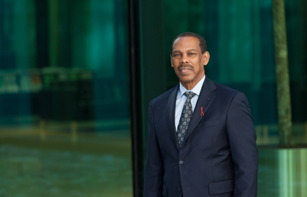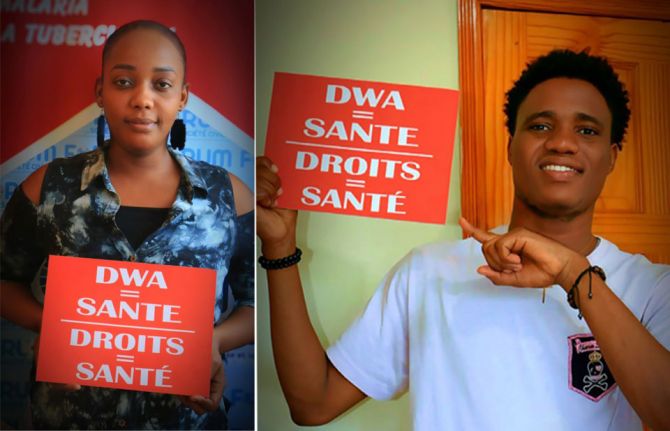
Feature Story
Interview with John Edward Greene, UN Secretary-General’s Special Envoy for AIDS in the Caribbean
07 December 2012
07 December 2012 07 December 2012The United Nations Secretary-General’s Special Envoys for AIDS are committed individuals selected by the United Nations Secretary-General to help advance the AIDS agenda at global level and to ensure that AIDS is kept high as a political priority in their respective regions. In a series of interviews with Unaids.org, the Special Envoys for AIDS share their views on the state of the AIDS epidemic and their own role in the global effort to end the epidemic.

John Edward Greene, United Nations Secretary-General’s Special Envoy for AIDS in the Caribbean
John Edward Greene was appointed the United Nations Secretary-General’s Special Envoy for AIDS in the Caribbean in November 2011, following his role as Assistant Secretary-General for Human and Social Development at the Caribbean Community (CARICOM) Secretariat.
Professor Greene has a long regional and international career in the fields of academia, social sector development, poverty alleviation, organizational development and AIDS. During his time at CARICOM, he crafted the blue-print for the establishment of the Pan-Caribbean Partnership against HIV and AIDS (PANCAP) which was recognized in 2004 as an international best practice in the response to HIV.
In 2010 he was honored by the Government of Suriname, which named him Grand Officer in the Order of the Yellow Star for his contributions to social development and health in the Caribbean, and particularly to the response to AIDS. He was also awarded the Lifetime Youth Award by the Caribbean Youth Ambassadors Corp for his pioneering role in the region’s youth and development agenda.
As one of the Secretary General’s Special Envoys for AIDS, what do you consider to be your role in the response to AIDS?
My role as Special Envoy is to advocate for the targets and commitments laid out in the 2011 Political Declaration on HIV/AIDS. In particular, I aim to promote the concepts of shared responsibility and sustainability of the AIDS response, and putting human rights at the centre of the response. These concepts have been identified as priorities by the Caribbean constituency.
What motivates you in this role?
I am working with UNAIDS to strengthen the Pan Caribbean Partnership Against HIV and AIDS (PANCAP), a unique partnership between governments, the private sector, NGOs and development agencies across the English, French, Dutch and Spanish-speaking Caribbean.
Many of the small states that make up the Caribbean lack the capacity to respond to AIDS effectively at a national level. PANCAP brings together national HIV programmes with international and regional organisations to achieve collective success in all areas of the AIDS response.
Young people are the new generation of leaders. They are the essence of the change that we are promoting to achieve the goal of an AIDS-free generation.
John Edward Greene, United Nations Secretary-General’s Special Envoy for AIDS in the Caribbean
At the community level, the challenge of reducing stigma and discrimination is being supported by the Champions for Change, a group of committed and well-respected individuals who act as project advocates and work to address these issues in their countries.
In addition, the Caribbean could be the first region in the World to achieve the elimination of new HIV infections among children and this is an exciting prospect.
What improvements are you seeing in the response to AIDS in the Caribbean?
Governments in the Caribbean are becoming increasingly aware of the need to invest in the AIDS response to avoid a regression on the progress that has been made in providing access to HIV treatment and prevention. They are also increasingly receptive to advancing the human rights agenda, and especially to removing punitive laws from the books.
What key issues and challenges remain in the region?
The biggest challenges we face in the region revolve around sustainability of HIV programmes, to sustain and scale up access to antiretroviral drugs as well as advancing the human rights agenda to reduce stigma and discrimination. The latter involves not only promoting the elimination of punitive laws, but also changing overall values and attitudes. This involves sustaining a dialogue for building on the concept of basic rights for all, based on the Universal Declaration of Human Rights.
In addition, while taking AIDS out of isolation has become a recurrent theme in the post-2015 agenda, it is important to stress the fact that AIDS is the only disease so strongly affected by stigma and discrimination.
During your time at CARICOM you actively supported and encouraged youth involvement in AIDS programmes. What is the role of young people in today’s AIDS response?
I am happy to say that young people are engaged in the development and implementation of HIV policy within the framework of PANCAP. The CARICOM Youth Ambassadors Programme has been very effective in engaging youth in the decision-making process in the region. As Special Envoy, I will work passionately with youth leaders and their groups to identify more creative approaches to discouraging risky behaviour, such as drug use and having multiple sexual partners, among young people.
Young people are the new generation of leaders. They are the essence of the change that we are promoting to achieve the goal of an AIDS-free generation.
Related
 Comprehensive Update on HIV Programmes in the Dominican Republic
Comprehensive Update on HIV Programmes in the Dominican Republic

19 February 2025


